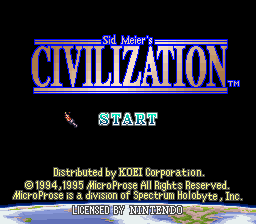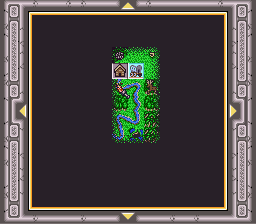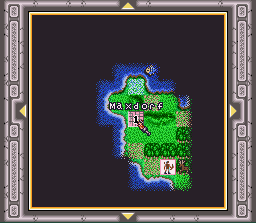Forum Links
Thread Information
Thread Actions
Order
A Masterpiece of the SNES era, and any other era for that matter
Game's Ratings
Overall
Graphics
Sound
Addictiveness
Depth
Story
Difficulty
Average User Score
7.9
5.3
5.7
9.3
9.7
4.5
5.7
02-23-13 08:39 PM
Eirinn is Offline
| ID: 744265 | 2038 Words
| ID: 744265 | 2038 Words
Eirinn
Level: 156





POSTS: 347/7900
POST EXP: 1300417
LVL EXP: 48317609
CP: 69413.8
VIZ: 1839823

POSTS: 347/7900
POST EXP: 1300417
LVL EXP: 48317609
CP: 69413.8
VIZ: 1839823

Likes: 0 Dislikes: 0
Sid Meler's Civilization takes you on the journey of mankind's developement from the dawn of civilizations on planet Earth, to the end. In this game you are made the head of a small tribe and are given a very straight foward goal: build great cities and cause civilization to flourish throughout the Earth. Your end goal: to rule the World. Simple enough, right? Well obviously not, but it is the task laid upon you from the heavens themselves. And with enough hard work, careful planning, and forethought, you will soon enough realize your dream. When your game begins, you have very little at your disposal: only a few settlers, and a handful of "resources", which function as the game's currency. You may use these resources to (as is typical with games of this nature) instantly develop army units, buildings, settlers, etc. instead of waiting the alloted amount of turns for them to be completed. You may also use these resources later to pay other nations to assist you in war, to buy off travelling thieves and the like that would otherwise plunder your villages, and convince them to join your military ranks (you must send a diplomat to do so), or to pacify the wrath of other rulers who threaten your nation. Spend these resources however you wish, but keep in mind that running a nation isn't cheap, and you have to keep enough resources handy to build armies, train settlers, and construct and keep up with maintenance costs on your facilities. Ah, economy issues anyone? You begin with a view of all of the known (to you) world, and it's not surprisingly small. Indeed, it appears to consist of nothing but your tribe, and a few square miles of surrounding earth. Which is about how the most ancient civilizations probably perceived the world. Once you develop a few army units, you may choose to use them to explore the parts of the world that until this point have been shrouded in darkness. As you do so, you will find other civilizations, some friendly and others hostile. Not only will you find the other nations that you are competing with, but you will also find clans, many of which will give you things, like resources, some will even accept your rule and become one of your cities, but a few will attack your armies. Defeating another nation's city will give you control of that city, but defeating a hostile clan of bandits will give you nothing more than another day for your ambushed armies to live. It's a tough world, but your people have the means to subdue it, if you try hard enough, and stay one step ahead of your foes. It's not all about brute force, but also wits.
Graphics: 6/10 Good. Far from special, the in-game graphics probably wouldn't impress even the NES generation. However these graphics are the perfect fit for this type of game, and if I were to rate them accordingly, they would probably get an eight or nine. They only appear so void of detail because the camera, of necessity, is zoomed out to such an extreme extent, that the mountains look like tiny bumps. This extreme angle is important, because this is the way the player can best see all of the action, and know where he/she stands in relation to surroundings and opposing forces or clans. This also grants the player adequate knowledge of where resources such as water and hills (for mining) are located, and the full view of the forrests, so that they will know how best to guide their army and/or civillian units, as travelling over mountains, or through forrests slows the faster units down considerably (each space takes two moves to traverse in these types of terrain). That said, you can see why everything lacks detail, as it would be impossible to have both this camera angle and detail. Still, in comparison to other Super Nintendo games, these graphics are slightly lower than average at best. The only thing that keeps me from rating it lower is the tremendous change in graphics during the opening and final scenes. Those are very detailed and of very high quality, and rank right up there with many of the best SNES games graphically. Also the inside views you get of your cities when a new building is finished, a city is built, or when a city is captured, are also nice, and change as time goes by (more modern houses are developed, and citizens dress appropriately for their time). So when it comes time to showcase graphics, Civilization is more than capable of pulling out the thirty-two bit cartridge eye candy. Sound: 8/10 Exceptional. Great tunes here, and very fitting for this type of game. They're about the kind of music you'd expect from a simulation like this one, but with a twist that plainly comunicates a historical theme. They did a fine job with the sound track, and the sound effects are nice, but I do question their choice of sound for battle effects. The ones they chose work alright, but I would have liked to hear swords clanging or guns firing, whichever was appropriate for the unit. The sound they chose is more of a sound that says "eliminated" or "destroyed", and plays as a unit is wiped out. No real faults here, just not as good as it could have been, and it probably won't leave you walking around with a tune stuck in your head afterward. Story: 6/10 Good. I loved the way they handled this part of the game. It's original enough, but there isn't enough of it. You're given an assignment to spread civilization all over the Earth, and to rule the world. You encounter other nations who will speak with you, and you get infrequent updates on what certain names in history have to say about the different civilizations of the world (who is the most advanced, etc), and at the end, you get a list of who you defeated and when you defeated them, and an ending scene telling you of your future. There's sufficient story here, and it's a good one, but there isn't enough to it to make it exceptional, so a six is fitting enough. Depth: 10/10 Incredible. This is one of the most in-depth games I've found on a console, especially one of it's time. Let me explain why. There is an insanely large variety of units and facilities to build, which you will unlock as you learn various technologies. What technologies you can develop depends on what technologies you have developed previously. For example, in order to develop Reading, you will need to develop writing (this may or may not be an example of two techs in the game that follow this pattrern, I can't remember, as there were too many to recall, though I didn't manage to exhaust them all). And what units/facilities you can develop, depends on what technologies you have developed. For example, before you can make chariots, you must have developed wheels (again, not necessarily an example of two actual techs/units in the game). As you progress through the game, you will slowly make your way to more modern technologies, such as electricity, and television. I suspect that there are also futuristic technologies, but I didn't get that far before eliminating all other countries. And even among the technologies that I found, there are far too many that you can research to be listed. Some examples are: Alphabet, Laws, Currency, Monarchy, Astronomy, Map making, Navigation, Math, Physics, Masonry, Bronze work, Bridging, Steam engine, mythology, iron works, Engineering, Literacy, Industry, Gunpowder, Chivalry, and that's not even half of what I had, not to mention the others that I hadn't learned yet. Next layer of depth is the units you produce, both military and civillian. Settlers, for example, can be produced and given the jobs of irrigation, building roads, building railroads, building cities, building mines, levelling forests, planting forrests, replenishing cities, and more. Millitary units may be issued a number of commands as well, such as: attack, defend, sentry, and plunder. Also they may be used for exploration, and moving them to a city belonging to another nation will cause an emissary to send to you for conditions of peace, which almost always (if not always) include threats from their ruler, who is often bluffing. Diplomats may: spy, subvert enemy units, and more. As for facilities, I'll spare to list them all, but I myself found probably around thirty different types of them, each having it's own unique effects. Couple all of this with your need to balance your budget, managing foreign relations (to befriend, appease, or flatten?), the ability to adjust how much to focus on taxes, luxury, and research, the decision of when to strike and when to wait for reinforcement troops to arrive, and when to put off war until your civilization can better afford the use of time and resources it takes to fund it. Finally, the decisions of when to make an item to improve the quality of your citizens' lives, and raise their happiness, and when to make defences and advance your society. In any case, you'd better keep them happy and in line with the law, or your city might fall subject to riots and more. And don't forget natural disasters, some of which you can protect against, and some you can't, so be prepared. There's also the ability to customize the map you play on, the time frame, choose from five difficulty levels, and choose to have anywhere from three to seven other civilizations to compete with. As you can see, there's so much depth here that I could go on for a good while, but I've said enough. Addictiveness: 9/10 Excellent. I lost some sleep staying up so late playing this one. Once you get started, it almost immediately sucks you in, and the further you get in it, the more difficult it becomes to tear yourself away from it. Several times I told myself "one more turn", and ended up playing six or seven more before finally managing to put it down. I'll definitely play this one again, but I may take some down time first, as it's extreme amount of depth can leave your brain a bit taxed after awhile. Difficulty: 4/10 Relatively Easy. I was a bit torn on what to rate it in this category, as I myself found it Very easy on the easiest setting (Chieftain, and three civilizations), so I would give it a three, but considering there's so much to learn, I could easily see rating it as much as a five. That said, I think a four works here. And with four more difficulty settings, and the ability to have up to seven other civilizations, I could see it being considerably more difficult. Overall: 7.8 Very good. There's a reason this game got one of the highest overall ratings that any game has ever gotten from me. Put simply, it's been a long time since I've enjoyed playing a new (to me) game this much. I love it. This is the best game of it's kind that I have found, but what else should you expect from KOEI? It's very well put together, and deserves every bit of this rating. In fact, my personal rating would probably be an eight and a half, or nine. There's just so much here. I was blown away by how well they executed a game like this on the SNES platform. Very impressive indeed. In conclusion, Civilization is a game I highly reccomend if you're into games that require strategy. It's brimming with possibilities and an incredible amount of depth. One could play through this game several times without researching every single technology, and doing everything that could be done in a single game. I know I'll go back to it sooner rather than later. It's a must play of it's genre, and it would be a shame to pass by such a an incredible game. The title of this review says it all: Sid Meler's Civilization is a masterpiece among games, from the dawn of gaming, to the present. |
Vizzed Elite
Affected by 'Laziness Syndrome'
Registered: 07-18-12
Last Post: 2495 days
Last Active: 2495 days
| Eirinn |
Affected by 'Laziness Syndrome'
Registered: 07-18-12
Last Post: 2495 days
Last Active: 2495 days


 User Notice
User Notice 






